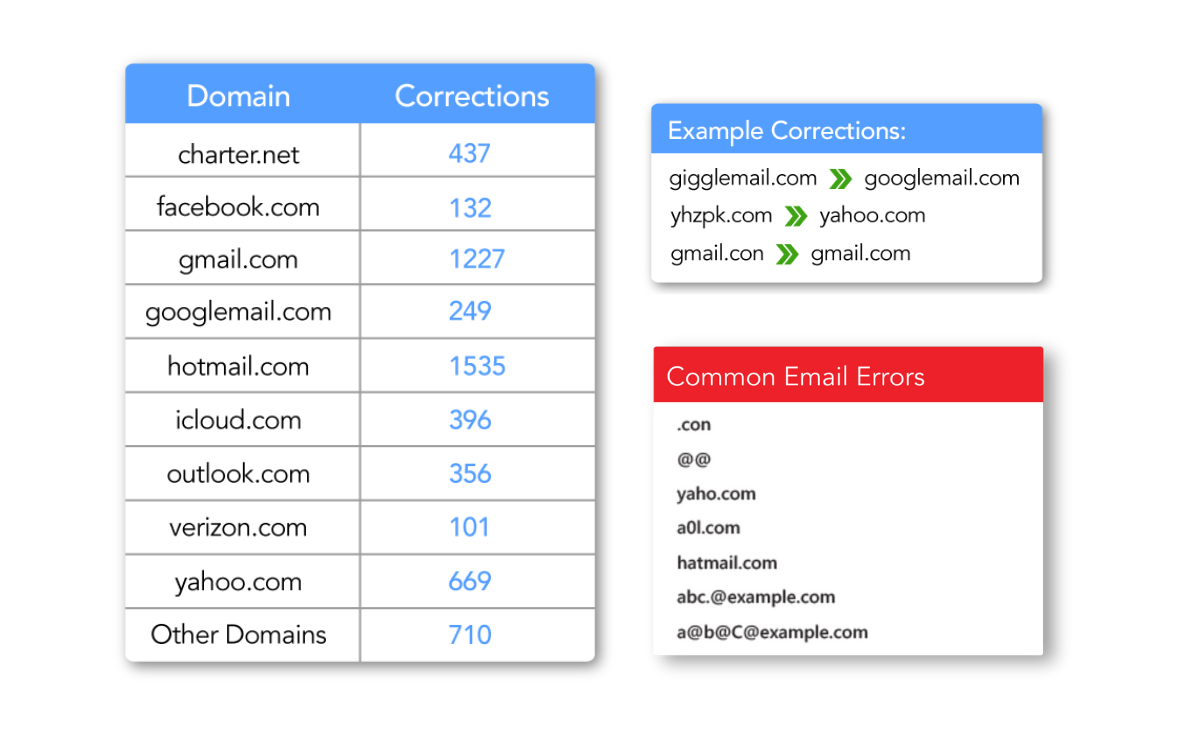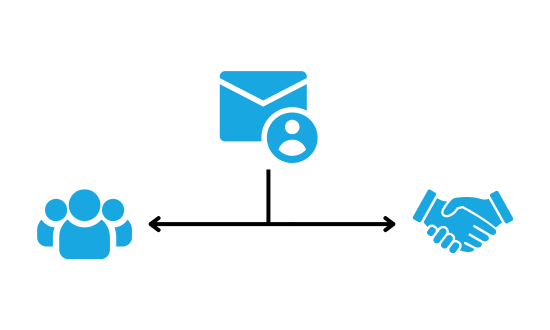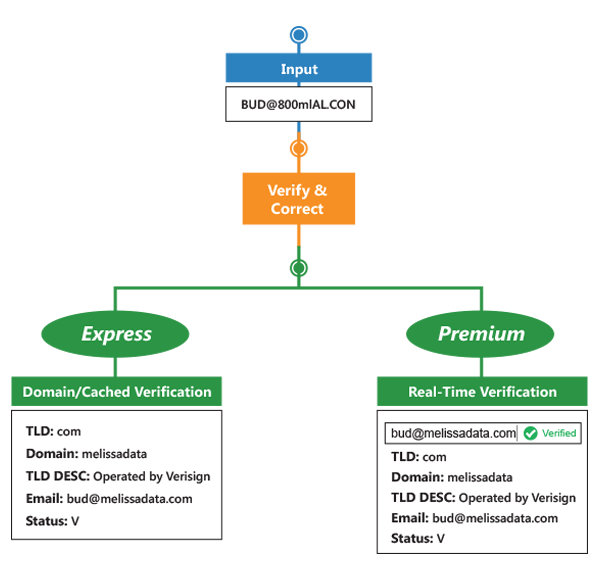Email Verification
Validate, standardize & score the deliverability of international emails in real time.
By incorporating email validation and verification tools at point of entry or in batch, you can:
- Reduce bounce rates
- Improve deliverability and engagement
- Reduce email marketing uncertainty
- Boost ROI
The Simple Solution to Verify Email Addresses and Improve Email Deliverability
Melissa Global Email Verification can remove up to 99% of bad email addresses to increase deliverability, avoid high bounce rates and blacklisting, and protect your valuable sender reputation.
- Ping each email in real time to ensure it is active and can receive mail to ensure a successful campaign.
- Improve deliverability by correcting typos, misspelled domains, and illegal characters that lead to high bounce rates.
- Reduce fraud by confirming only valid, not fake emails enter your systems.
- Protect your web reputation by avoiding email addresses and domains that are likely to flag you as a spammer.
- Maintain CAN-SPAM compliance with FCC mobile domain detection.
- Check against domain authentication protocols SPF, DKIM and DMARC.
- Identify a business or personal email based upon the domain.
Email Verification Features:
-
Deliverability Confidence Score
Measure deliverability with precision. Our score scales from 0-100, offering a dynamic score to simplify marketing decisions and protect your sender reputation. -
Predictive Accept-All Validation
Go beyond basic detection of accept-all addresses. Our predictive validation determines deliverability potential, minimising risks in sending when leveraging the Deliverability Confidence Score. -
Clear and Actionable Result Codes
Quickly understand and categorise email types with our intuitive result codes—no guesswork required. -
Syntax and Domain Correction
Global Email corrects syntax first, ensuring each email address is validated accurately. Robust syntax rules and domain correction algorithms can correct common typos and improve the user experience.
Real-Time Email Address Verification
Two levels of service are available depending on your speed & accuracy needs.
- Global Email Premium provides real-time email mailbox checking domain-specific logic as well as SMTP commands and other proprietary mechanisms to validate inboxes are live. This can take up to 12 seconds per email address. Our built-in “time-to-wait” option allows you to customise how long you want customers to wait for a real-time validation.
- Global Email Express offers higher speeds and performance than Premium by using a cached inbox validation database of known good and bad emails. All emails sent to the service will also be cached so they can be re-evaluated within a 90-day cycle.
Deliverability Confidence Score (DCS)
Our Deliverability Confidence Score (DCS) combines a range of variables and email validation methods to predict the likelihood that a message will successfully reach its intended inbox. The DCS consolidates the validation results and simplifies it to a score from 0 to 100. This score helps you focus on emails that are not only valid but also more likely to be active and engageable. Leveraging DCS to refine your email marketing lists will ensure you reduce bounces and increase ROI.
Determining Factors for DCS:
- Validation Status - The overall status as well as any special flags associated with an email.
- Email Metadata - Information such as email age and historical engagement provides valuable insights into the email’s activity level.
- Domain Information - The type and security architecture of a domain help predict any complications with email delivery.

Predictive Accept-All Validation
Our Predictive Accept-All Validation feature offers a unique approach to evaluating emails hosted on accept-all servers. While these servers might typically mask inactive or invalid addresses, our proprietary Predictive Accept All algorithm analyses patterns and traces of historical activity, giving users a reliable window into the likelihood of successful delivery.
- Accept all domains are configured to accept emails sent to any address, regardless of whether that specific address actually exists or is inactive.
- The predicted deliverability of an accept all mailbox will be reflected by the Deliverability Confidence Score (DCS) for that email.
Syntax Checking and Domain Correction
Utilises state-of-the-art fuzzy matching and data correlation algorithms to automatically correct common email errors, such as misspelled domains, outdated providers, and syntax mistakes.
Global Email will validate the corrected and standardised version of the input email. By identifying and fixing typos like “gamail.com” to “gmail.com” prior to validation, the system ensures that each email address is accurate before it’s verified, leading to better results and enhanced mailing lists.
- General Syntax Checking - Enforces universally accepted email syntax rules and standardises the email address.
- Domain Corrections - Corrects the most common misspelling and typos for popular domain names.
- Domain Changes - Corrects outdated domain names belonging to an organisation to their new domain name.


Potentially Harmful Mailbox Types
- Spamtrap Detection - Detects spamtrap addresses at both the mailbox and domain level so you can get ahead of them and safeguard your sender reputation.
- Protected Mailbox Detection - Detects whether the mail provider is notorious for quickly marking unsolicited messages as a spam email.
- Suspicious Character Detection - Identifies characters that are not typically found in email addresses. These types of addresses can be used for advanced attacks, like SQL injection, on a business's infrastructure.
- Identifies Breached Emails - Identifies if, and how many times, an email address has been involved in a data breach in the past.
- Mobile Email Detection - Identifies mobile emails that are protected by FCC regulations. Sending unsolicited emails to these addresses can incur heavy fines.
Negative Indicators
- Disposable Domain Detection - Detects disposable email domains so you can avoid sending messages to temporary emails. Disposables are designed to become inactive after a short period.
- Accept-All Server - Identify mailboxes that are part of an accept-all mail server. These mail servers can claim validity regardless of the true status of an email address.
- Role Address Detection - Detects role addresses, like support@ticketmaster.com, that are unlikely to engage with emails unrelated to their specific function.
- Privacy Flag - Identifies email addresses that may be subject to privacy laws such as GDPR or CCPA.

Domain Information
- Domain Authentication Methods - Identifies how mail servers authenticate senders, allowing you to meet requirements and ensure delivery.
- Domain Information - Distinguishes between business and personal domains and provides comprehensive insights such as the domain’s locality, administrative organization, and even proxy usage. This helps you better categorise and characterise recipients.
Privacy Flag
The top level domains or countries that may be sensitive to privacy laws. Returns Y for yes and N for no. Handle emails with a Y in privacy flag with caution.
The Privacy Flag will show a “Y” if the Top Level Domain might adhere to privacy laws such as GDPR. For example, the Top Level Domain “.de” is a German Top Level domain. Any Top Level Domain that end with a “.de” will have a “Y” in the Privacy Flag field. Any Top Level Domain that does not adhere to privacy laws will have an “N.”

Helpful Resources



